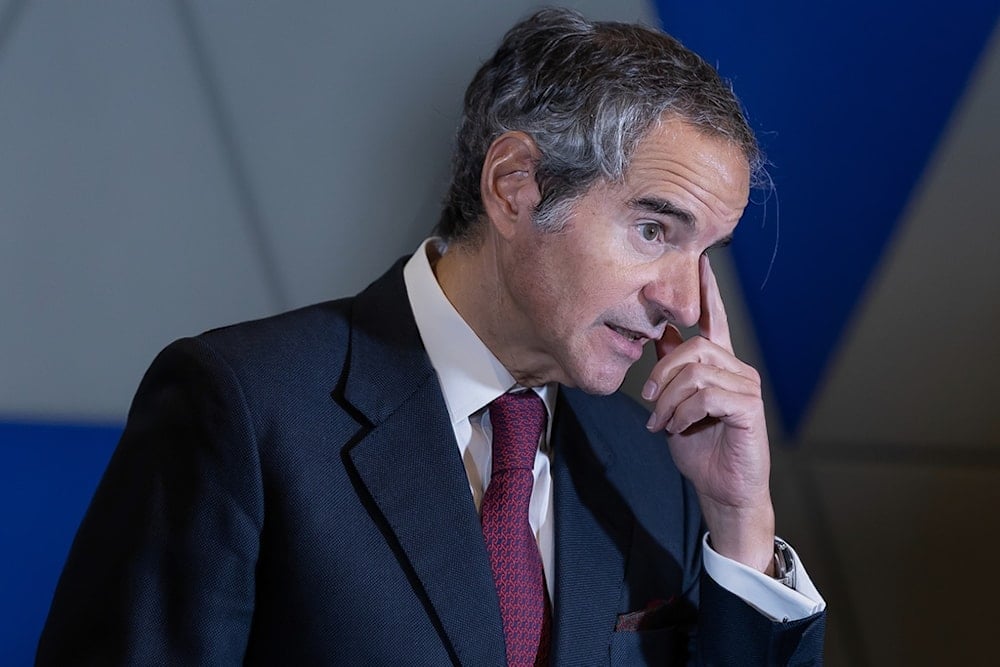IAEA says Iran inspections continue under NPT safeguards
The IAEA’s Rafael Grossi affirms that inspection authority in Iran remains unchanged under NPT safeguards, urging continued cooperation to resolve operational issues.
-

In this photo provided by Rosatom State Atomic Energy Corporation, International Atomic Energy Agency (IAEA) Director General Rafael Grossi speaks during a news conference in Kaliningrad, Russia, Friday, November 14, 2025 (AP)
IAEA Director General Rafael Grossi stressed that the agency’s authority to conduct inspections in Iran remains unchanged, affirming that the IAEA continues to carry out its mission under the Comprehensive Safeguards Agreement as part of the Nuclear Non-Proliferation Treaty (NPT). His remarks came in response to questions from Al Mayadeen during a press conference, reinforcing that the IAEA’s monitoring and verification capabilities inside Iran remain active.
Grossi noted that Iran has chosen to remain within the operational frameworks of the agency and the NPT, ensuring that legally binding safeguards continue to apply. He explained that the issue is not one of legal authority but rather the level of practical implementation, where some inspections proceed smoothly in the field while others face delays.
He said there has been no official refusal from Iran regarding requested inspections, yet some responses remain pending, prolonging the process and preventing certain tasks from being completed.
The IAEA chief emphasized that the agency’s inspection and monitoring abilities have not changed and were not affected by the events that took place in June following the Israeli-US aggression and the subsequent reactions. He added that Iran has enacted a domestic law that the agency respects, but stressed that such legislation cannot impede the country’s responsibilities as an NPT member.
Need for ongoing dialogue with Iran emphasized
Grossi considered the situation manageable and highlighted that the focus remains on continuous engagement with Iranian authorities to advance implementation and avoid further delays.
Regarding the presence of inspectors in Iran, Grossi clarified that deployment depends on the scheduled activities, stating: “If we have one inspection session per week, there is no point in staying 10 days. We come for the week, then we leave and return again.”
He underlined that whether inspectors are permanently based in the country or arrive periodically does not affect the agency’s ability to access sites, since access is determined directly by agreed inspection operations.
Al Mayadeen obtains IAEA draft resolution
Three European states that participated in the 2015 nuclear deal with Iran, the United Kingdom, France, and Germany, also known as the E3, plan to introduce a draft resolution against Iran during the upcoming session of the International Atomic Energy Agency (IAEA) Board of Governors, scheduled for 19-21 November. Al Mayadeen has obtained a copy of the document.
The draft resolution expresses concern over a recent IAEA report by Rafael Grossi, the agency’s Director General, which emphasises that the IAEA must immediately verify Iran’s declared nuclear material stocks to allay fears and ensure compliance with its safeguards agreement under the Treaty on the Non‑Proliferation of Nuclear Weapons (NPT).
Key points of the draft include:
- It holds that Iran is legally bound, under UN-imposed non-proliferation measures reinstated on 28 September 2025, to suspend all enrichment, re-processing, and heavy-water projects, including research & development, and to implement the modified Code 3.1 of its safeguards agreement.
- It expresses regret that Iran has failed, during the last five months, to provide the IAEA with the required information on its enriched uranium stocks and safeguarded nuclear facilities.
- It demands that the Director General report before each quarterly Board meeting on Iran’s safeguards implementation, including verified data on uranium stocks, enrichment levels, centrifuge inventory, chemical forms and locations, and that these reports be forwarded in parallel to the UN Security Council in line with past practice.
- The resolution reaffirms that Iran’s failure to allow verification of its highly-enriched uranium stockpile constitutes a serious compliance concern under Article 12.c of the IAEA Statute and references IAEA Board Resolution GOV/2025/65.
- It urges Iran to comply without delay with all relevant UN Security Council resolutions (including 1696 (2006), 1737 (2006), 1747 (2007), 1803 (2008), 1835 (2008), and 1929 (2010)).
- It also calls on Iran to fully implement its Additional Protocol and the modified safeguards conditions.
- Finally, it instructs the IAEA to re-insert the “Implementation of Iran’s Safeguards Agreement under the NPT” on the Board’s agenda from its next ordinary session and provide a separate status report on the resolution's implementation.
No review of the implementation of commitments
In a departure from the practice since 2015, the board will not be reviewing Iran's implementation of its commitments under the Joint Comprehensive Plan of Action (JCPOA), as the Vienna Agreement between Iran and the international powers is no longer in effect.
The Director General of the International Energy Agency, Rafael Grossi, will present a comprehensive report on the opening day of the meeting regarding Iran’s commitments to the treaty and to the agreement reached in Cairo on September 9 with Iranian Foreign Minister Abbas Araghchi. Al Mayadeen obtained a copy of this report.
Grossi revealed in his report that the International Agency addressed a message to Iran dated November 7, 2025, confirming that "providing the agency with the possibility of access to carry out its planned activities in Iran is an obligation incumbent on Iran under the safeguards agreement concluded with it under the Nuclear Non-Proliferation Treaty, and therefore, Iran is expected to facilitate all these access operations" in accordance with the agency's need.

 5 Min Read
5 Min Read










